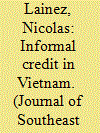| Srl | Item |
| 1 |
ID:
118907


|
|
|
|
|
| Publication |
2012.
|
| Summary/Abstract |
The English East India Company established a factory on the island of Condore, off the coast of southern Vietnam, in 1702 as part of its plan to maintain a settlement to direct shipping activities between trading ports in China and Southeast Asia and India. For three years, the settlement thrived and was an important part of the China trade network, especially as a stopping point for ships plying the China route. The island settlement also carried out trading activities with neighbouring ports along the Indochina coast and the Malay Archipelago. The setting up of the factory, however, coincided with the emergence of the new entity of southern Vietnam under the Nguy?n family who were expanding their power-base to the south. In the process, the Nguy?n had already subdued the Chams and were coming face-to-face with the Khmers when the English factory was established. This paper will trace the English venture on Condore Island and the reaction of the Nguy?n ruler towards this venture which culminated with the destruction of the factory in 1705. This paper will attempt to explore the following questions: the shifting importance of the islands in the Nguy?n's security and foreign relations vis-à-vis the English factory, and will also investigate the circumstances that brought about the massacre and destruction of the English factory on Pulo Condore-a historical event that has not been properly explained thus far.
|
|
|
|
|
|
|
|
|
|
|
|
|
|
|
|
| 2 |
ID:
130057


|
|
|
|
|
| Publication |
2014.
|
| Summary/Abstract |
The state of knowledge about finance and credit in Vietnam remains fragmentary despite
the interest that economists have shown in the topic over the past fifteen years. This paper explores why informal finance continues to enjoy great popularity among rural households despite its high price and risks in Southern Vietnam. This research note examines in detail three modes of credit, and shows that borrowers' perception of informal credit does not always correspond to that of government financial and international institutions. The social dimension of informal finance is crucial to understanding its prevalence, adaptability and continuity in Vietnam. From the point of view of the borrowers, informal credit is not perceived as an evil but rather an economic necessity.
|
|
|
|
|
|
|
|
|
|
|
|
|
|
|
|